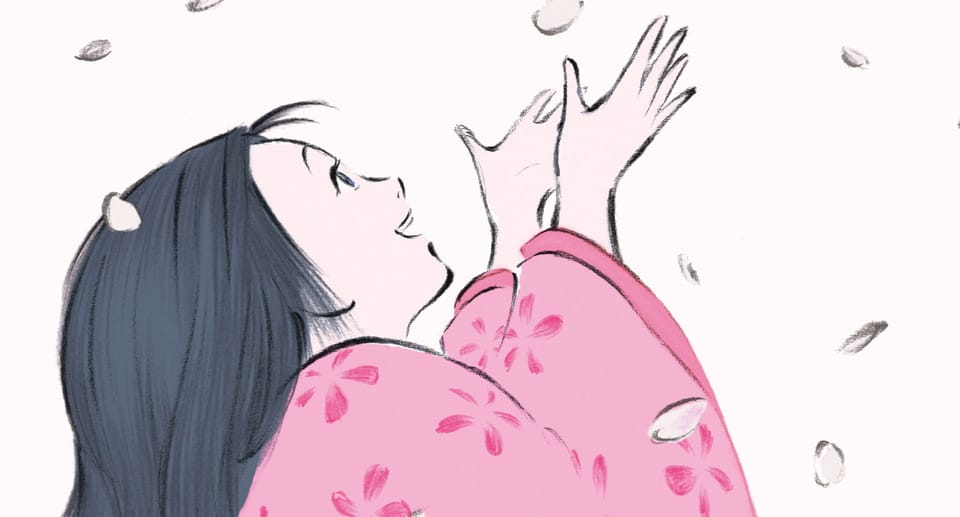The Tale of Princess Kaguya (2014)

I never start a review by making an assertion, but for once, allow me to make an exception. The Tale of Princess Kaguya is not only the finest feature film by Studio Ghibli co-founder Isao Takahata (Grave of the Fireflies, Only Yesterday, Pom Poko); it is arguably the crowning achievement of Japanese cinema to this day. The visuals, character development, and its philosophical depth are only comparable to the very best of film history, and not just limited to Japanese or animated films. In short, this film completely blew me away.
Princess Kaguya is based on the ancient Japanese story about a baby-girl who was ‘born’ from a bamboo shoot. An old and childless couple find her and raise her as their own. Determined to give their beloved daughter a better life than they have had, the family moves to the Capital, where her godly beauty starts to attract public attention as she grows into a beautiful woman. As her parents amass fortune and climb social ranks, Princess Kaguya withers in unhappiness and longs for life back in the country where she was initially raised. Yet, her time on the earth is nearing its end as she must return to where she is originally from.
It is clear from the storyline above that this film bears the signature of Takahata. There is his unmistakable rejection of hollow consumerism represented by an urban lifestyle, and his strong endorsement for a wholesome life in the country where one is an integral part of a natural environment. All of this has been told by him before. Yet, there is one crucial difference which sets this film apart from the rest of his work: this film is a fantasy, and a very fine one at that. I think Takahata even got the better of his celebrated colleague, Hayao Miyazaki, with this latest effort.
The fact that Kaguya is a fantasy is astonishing. He is known to be more of a social realist compared to Hayao Miyazaki. Whereas Miyazaki shares his vision through dazzling fantasy, Takahata wants us to rediscover the enchantment of ordinary moments in life. Whilst Miyazaki creates movies that deal with what he sees as the ills of modern civilisation at a purely philosophical level, Takahata always offers either possible solutions or pointed criticisms of modernity in Japan based on his assessment of the concrete situation of contemporary Japanese society. Takahata, throughout his illustrious career, is supposed to be the down-to-earth critic as opposed to Miyazaki the wizard. So it begs the question: What made Takahata want to direct a fantasy movie like Kaguya in the first place?
The reason Takahata needed the format of fantasy is that he wished to go even further than he usually does with Kaguya. In this film, he is not trying to offer a critique and/or a solution to the concrete problems in modern Japanese society. What he is dealing with here is not what might bring back the magic in our everyday life; it is rather showing the enchantment of living itself. The journey of Kaguya shows that seeking what might bring magic in our life is misguided. Material comfort, social status, or fame cannot make your life wholesome. This story shows instead that, if lived fully, life is magical with all its joys and its sorrows. Happiness is not the absence of pain and/or discomfort. Kaguya rather wants to feel all of it, for being open to what the world offers, despite its challenges, makes her feel alive. She’d rather work hard to earn food because it makes her life wholesome. It is at this point where Takahata finds himself with the company of greats such as a German director Wim Wenders, whose masterpiece, Wings of Desire, offers a poetic affirmation of the life of ordinary humans despite everything, or a French novelist and philosopher Camus who famously said: Live, to the point of tears. And, with Takahata’s stunning visuals and masterful storytelling, we can live through the wonder of life, and the lack of it, through the eyes of Kaguya. For once, Takahata adopted a fantasy, and the result is truly magical.
And, at the very end, Takahata asks us the very question asked by Hannah Arendt in The Human Condition: Why are we always trying to escape from the human condition? This question should be followed by asking ourselves the following questions. Why are we trying so hard to eliminate the so-called problem of life rather than live it through? Why must we be ‘happy’ all the time? Why are we not allowed to feel miserable from time to time? For, as Rilke famously suggested, isn’t it through this lens that life finds meaning?
All of these questions have been asked before. Yet, the world never experienced them with such beauty, poignancy, and intensity before.
Please do not miss this masterpiece. I am glad that I now have this film in my life rather than not.